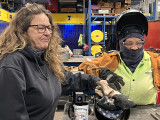When I walked into [the first class], I immediately wanted to empower these women.
Women seeking a career in the trades take a 10-week training course learning the basics necessary in the building trades.
View Photo Gallery (5 photos)
Thanks to a Department of Labor workforce grant, L-237 (East Hartford, Connecticut) offered women a training class to acquire the skills necessary for employment in the union construction trades. Instructors for the Women Can Weld Apprenticeship Readiness Class were L-237’s Martha Bjornberg and L-237’s lead apprenticeship instructor Eddie Chicoine.
The comprehensive 10-week training course logged in 120 classroom hours, 200 hand-on hours, and taught over a dozen women welding processes SMAW, GMAW and GTAW. In addition, students also learned safety, hand signaling, basic math and blueprint reading, financial literacy and other essentials to launch them into a career in a union construction trade. Most students left the class with at least one welding certification, an OSHA 10 certification and certifications in rigging safety and awareness, hand signaling, fire watch and CPR/first aid.
“I ask these girls, ‘are you going to go to a tech school for $35,000 or come to the Boilermakers, shell out $1,000 over four years, and then graduate?’” said Bjornberg. She said the first eight weeks were spent on classroom instruction and primarily teaching students how to weld.
“I want them to love it like I loved it,” she said, adding that she fell in love with welding the first time she held a torch. “But I tell them if they don’t love it, don’t do it.”
There were some students who loved welding from the first spark, one being a potential Boilermaker Melody Fellows, who already to the apprenticeship program before class ended.
“I want to be a Boilermaker. I love welding,” she said.
“When I’m welding, I’m in my own little world.”
Another was retired teacher Maura Sullivan. She hopes to use her knowledge of the trades to give viable career options to high school students who don’t want to attend college.
“I want to be an advocate for the trades,” she said. “Hopefully, I can visit schools and talk to the juniors and seniors. And how can I advocate for something I don’t know about?”
Then-IR and L-237 Secretary-Treasurer Chris O’Neill said high school students need to have career options that don’t involve college. He said that the U.S. Department of Labor is finally seeing a need for workforce development, apart from college.
“You need people to build things and money to do it,” he said. “Now we have the money, but we don’t have the people. Shame on educators for not pushing the trades.”
O’Neill said the DOL workforce grant came to the local through BTTI—the Building Trades Training Institute, formed in 2022 under the Connecticut State Building Trades. The institute began under the direction of Joe Toner, a Local 15 Ironworker and executive director of the Connecticut State Building Trades. BTTI provides pre-employment preparation services to Connecticut residents interested in entering unionized registered apprenticeship training programs. And getting women into the trades is an important focus for BTTI.
While this grant wasn’t specifically one to funnel all the women into the Boilermakers, it is specific to the union building trades. And most of the women in the program were heading into various union apprenticeship programs upon graduating from Women Can Weld.
“We are trying to make them tradespeople,” Bjornberg said. “We’re doing the program to educate the girls on opportunities in the building trades. Now a few weeks in, they have a little skill and a little bit of self-confidence.”
O’Neill said that women can help other women navigate through the building trades, which are male dominated.
“I value having women in the workplace. That’s why we took the program,” he said. “Martha has been a part of the local for a long time. She doesn’t need a man to do her job for her. She’s the perfect instructor for this program.”
Bjornberg said having a woman teaching other women can better prepare them for what they’ll experience in the trades, working alongside men.
“When I walked into [the first class], I immediately wanted to empower these women,” she said. “Teach them that they can stay true and strong, that they can do this if they really want to do it, but they have to show up. I tell them ‘You’re doing a job for the money. No one is doing you any favors.’ It’s been such a good experience for me to see them light up when they get it.”
Read about instructor Martha Bjornberg’s journey into the Boilermakers during a time when few women worked construction.










